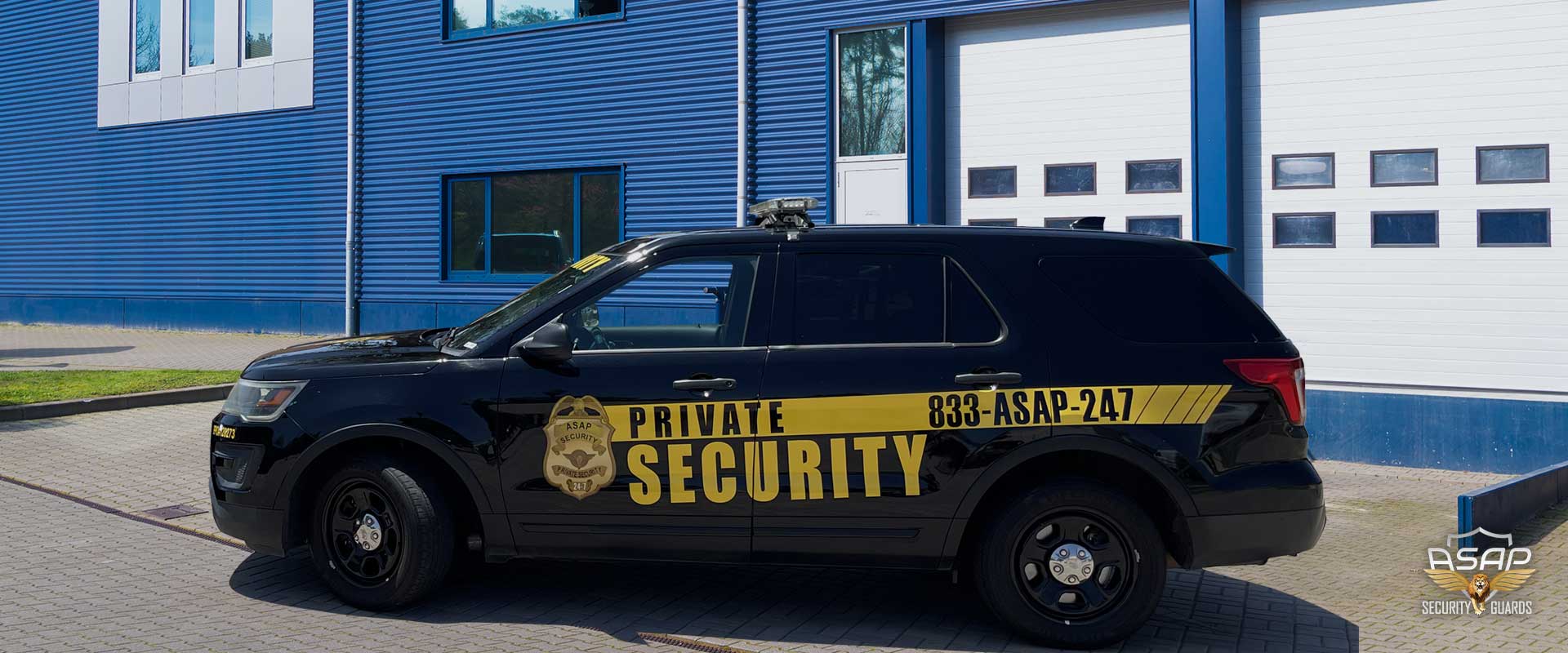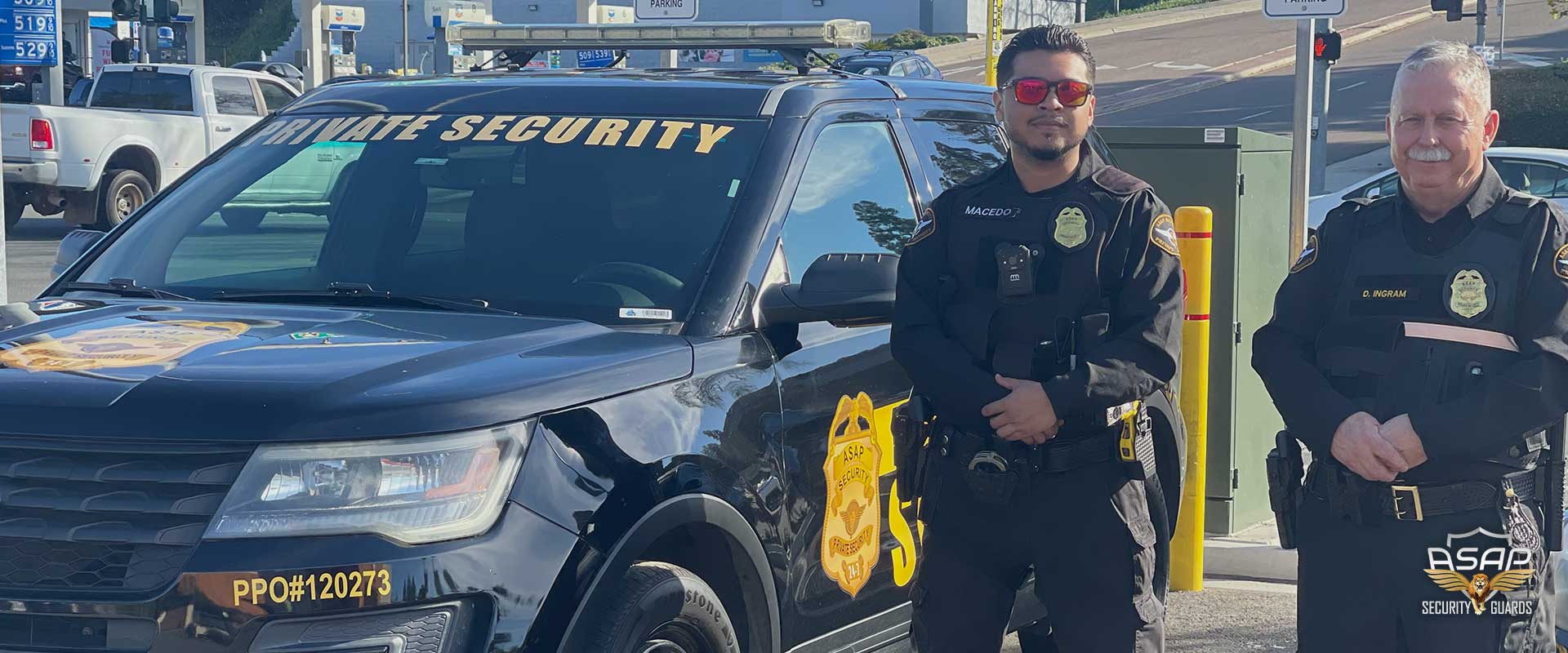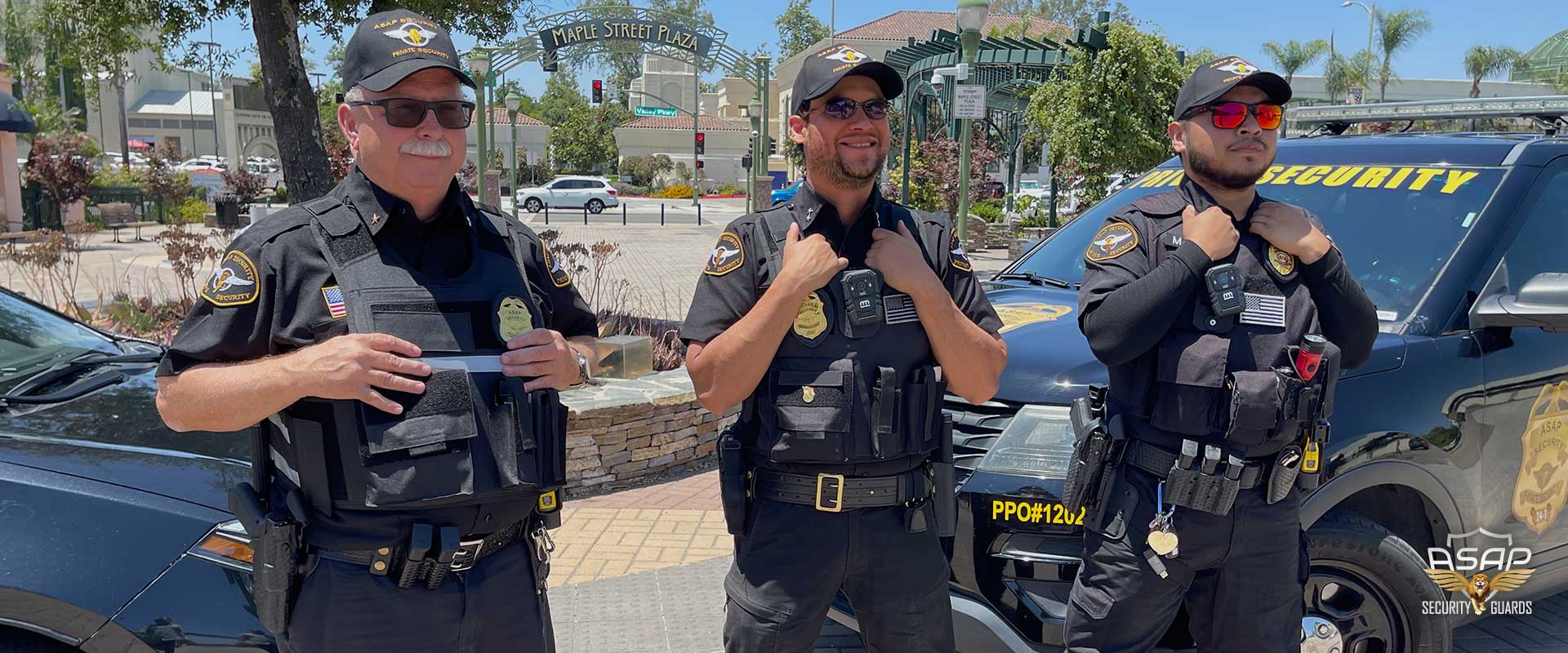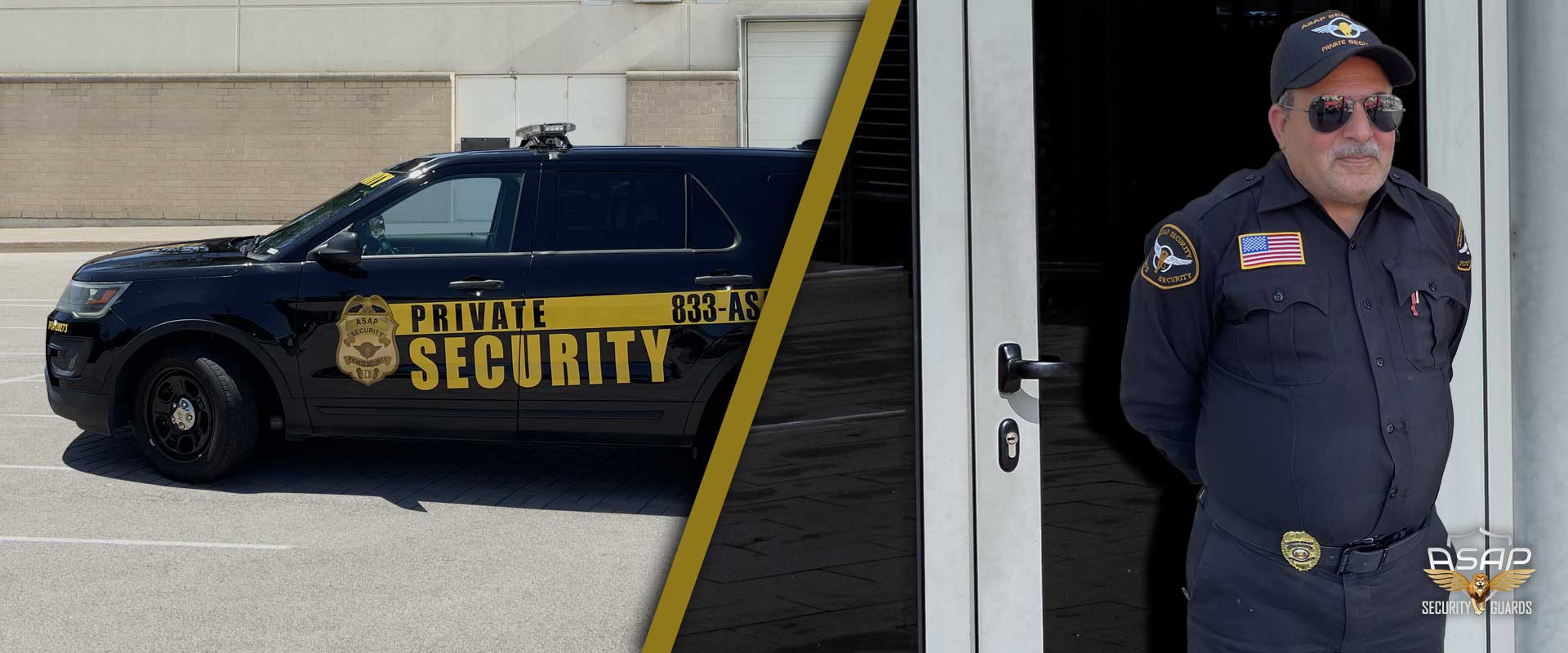Written by Rafi Kalliny
Security is a vital consideration for any business in San Diego, particularly those managing large properties like warehouses, automobile dealerships, or commercial office buildings. These properties often require extensive coverage, with numerous entry points and high-value assets that need safeguarding. Mobile security patrols provide an ideal solution, offering flexibility, enhanced visibility, and rapid response—all while remaining cost-effective.
In this article, we explore how mobile security patrols work, the industries that benefit from them, and why they are an essential part of maintaining comprehensive security for expansive properties. We’ll also look at the different types of security patrols available and how they can be customized to meet your business’s unique security needs.
 What Are Security Patrols?
What Are Security Patrols?
Security patrols are a fundamental aspect of maintaining safety and protecting assets across a wide range of environments. They act as a frontline defense against criminal activity, unauthorized access, and potential hazards. Security guard patrols can be carried out on foot, using vehicles, or even with the help of technology, such as drones and surveillance systems. The goal is simple: ensure that property remains secure and free from harm by being present, visible, and ready to respond to any incidents that may occur.
The effectiveness of a security patrol depends on choosing the right type of patrol based on the property’s needs. Mobile patrols are ideal for large properties, such as warehouses or automobile dealerships, where coverage of expansive areas is necessary. Foot patrols provide close interaction and vigilance in environments like office buildings or residential complexes. Stationary patrols ensure strict access control at high-security locations, while random patrols add an unpredictable element that deters criminal activity.
Below, we break down the different types of security patrols and their specific roles in creating a secure environment.
Get In Touch
Our staff of Security Patrol professionals are ready to hear from you!

Different Types of Security Patrols
Mobile Patrol Security
Mobile security patrols are among the most versatile and efficient types of patrols available. They involve security guard personnel using vehicles to patrol large properties, such as industrial sites, warehouses, car dealerships, and commercial complexes. By using vehicles, mobile patrols can cover significant distances in a short period, ensuring that all areas of a property are regularly monitored. The visible presence of a security guard patrol vehicle serves as a strong deterrent to potential criminals, signaling that the area is actively patrolled.
Key Benefits of Mobile Patrols:
- Coverage of Expansive Areas: Mobile patrols are particularly beneficial for properties like warehouses or car dealerships, where vast perimeters need constant monitoring. These patrols can navigate large lots or multi-building sites, offering comprehensive security coverage.
- Rapid Response: Because mobile patrols are always on the move, they can quickly respond to incidents or emergencies. Whether it’s a break-in, vandalism, or a fire, mobile security teams are well-equipped to handle the situation and provide immediate action.
- Crime Deterrent: The visibility of a mobile patrol unit driving through a property creates a strong deterrent against criminal activities, often dissuading potential trespassers or thieves from targeting the property.
Industries That Benefit:
- Warehouses: Warehouses often store valuable inventory and equipment, making them a target for theft. Mobile patrols provide both interior and exterior monitoring, checking for unauthorized access or suspicious activity around the perimeter.
- Automobile Dealerships: Car dealerships have extensive outdoor lots filled with high-value vehicles, making them vulnerable to theft and vandalism, especially after hours. Mobile patrols can monitor these lots, deterring criminals and responding quickly to incidents.
- Industrial Sites: Industrial sites often have complex layouts and multiple access points. Mobile patrols regularly check for security breaches, safety hazards, or unauthorized personnel, providing comprehensive coverage for the entire site.
Foot Patrols
Foot patrols are a more hands-on, close-range form of security. Security guards walk through designated areas on foot, allowing for personal interaction with employees, visitors, or residents. This method of patrol is especially useful in environments that require direct observation, such as office buildings, shopping centers, hotels, or residential complexes.
While foot patrols cover less ground than mobile patrols, their ability to engage directly with the public makes them an effective security presence. Guards can identify potential threats, resolve issues as they arise, and provide assistance to employees, tenants, or visitors.
Key Benefits of Foot Patrols:
- Close Interaction: Foot patrols allow guards to engage with the community, providing a reassuring security presence. This personal connection is valuable in environments where customer or resident satisfaction is a priority, such as hotels or apartment complexes.
- Visibility and Deterrence: Walking through a property on foot ensures that security personnel are highly visible to potential criminals, making them think twice before attempting any unlawful activity.
- Thorough Monitoring: Foot patrols can inspect areas that might be difficult for vehicles to access, such as narrow hallways or staircases, ensuring all parts of the property are secure.
Industries That Benefit:
- Apartment Complexes: Foot patrols are effective in residential communities, providing security that residents can see and interact with. Guards can monitor common areas, parking lots, and entrances, ensuring only authorized individuals are on the premises.
- Hotels: In the hospitality industry, ensuring guest safety is paramount. Foot patrols can provide security in lobbies, guest floors, and public areas, ensuring guests feel safe throughout their stay. Guards can also offer assistance, like helping with directions or lost items, further enhancing the guest experience.
Stationary Security Patrols
Stationary security patrols involve guards being positioned at strategic locations, such as building entrances, exits, or other critical points. These guards serve as the first point of contact for anyone entering the property. Their primary role is to control access, ensuring that only authorized personnel are allowed to enter. This makes stationary patrols essential for high-security environments where access control is a top priority.
Key Benefits of Stationary Patrols:
- Strict Access Control: Stationary patrols are crucial in environments where access needs to be tightly controlled, such as government buildings, hospitals, or data centers. Guards can verify credentials, check IDs, and ensure that only authorized individuals enter restricted areas.
- Visible Security Presence: Stationary guards provide a constant, visible security presence at key access points, reassuring employees, visitors, or residents that their environment is protected.
- Immediate Response to Incidents: While stationary guards don’t patrol the property, they are strategically placed to quickly respond to incidents at critical points, such as building entrances or sensitive areas.
Industries That Benefit:
- Hospitals: Security in hospitals is about more than just protecting physical assets. Stationary patrols positioned at emergency rooms, entrances, and restricted zones ensure that sensitive areas are protected and that unauthorized individuals cannot gain access.
- Manufacturing Plants: In manufacturing facilities, certain areas may be restricted due to safety concerns or the handling of sensitive or hazardous materials. Stationary patrols control access to these areas, ensuring that only employees with proper clearance can enter.
Random Patrols
Random patrols add an element of unpredictability to security services. Rather than following a fixed route or schedule, random patrols conduct their rounds at varying times and through different routes, making it difficult for potential criminals to predict their movements. This unpredictability is one of the greatest strengths of random patrols, as criminals typically exploit patterns in security.
Key Benefits of Random Patrols:
- Unpredictability as a Deterrent: By varying patrol routes and times, random patrols make it significantly harder for criminals to plan their activities. This unpredictability keeps would-be criminals off-balance and less likely to attempt unlawful behavior.
- Comprehensive Coverage: Random patrols ensure that all areas of a property receive attention. By changing their routes, security personnel can ensure that no part of the property is left vulnerable.
Industries That Benefit:
- Car Dealerships: In businesses where valuable assets are displayed outdoors, such as car dealerships, random patrols keep criminals guessing. Their unpredictable presence makes it harder for thieves to plan or execute theft.
- Warehouses: Warehouses with large inventories are vulnerable to organized theft. Random patrols prevent criminals from targeting these properties, as they can’t anticipate when and where security personnel will be present.
 Customizing Security Patrol Solutions
Customizing Security Patrol Solutions
Every business has unique security needs, which is why a one-size-fits-all approach is rarely effective. Customizing security patrol solutions ensures that your property receives the right kind of coverage based on its specific vulnerabilities and requirements. Combining different types of security patrols—mobile, foot, stationary, and random—creates a comprehensive security plan that addresses all aspects of property protection.
Combining Patrol Types for Optimal Coverage:
- Mobile and Foot Patrols for Large Complexes: In large commercial complexes, a combination of mobile and foot patrols provides optimal coverage. Mobile patrols can cover the larger exterior areas, such as parking lots and perimeter fencing, while foot patrols focus on entrances, lobbies, and other interior areas that require closer observation.
- Stationary and Random Patrols for High-Security Areas: For areas that need strict access control—such as data centers, manufacturing facilities, or areas containing valuable inventory—stationary patrols can monitor key access points, while random patrols create an unpredictable presence throughout the rest of the property.
- Customized Patrol Schedules: Businesses can also adjust the frequency and timing of security patrols based on their operating hours and known high-risk periods. For example, an automobile dealership may need more patrol coverage during the night, while an office building may require heightened security during peak hours when employees are present.
Customizing a security patrol solution ensures that your property is protected in the most efficient and effective way possible, providing peace of mind that all vulnerabilities are being addressed.
Get In Touch
Our staff of Mobile Patrol Security professionals are ready to hear from you!

Benefits of Security Patrols in Crisis Management
While security patrols are crucial for day-to-day operations, their role becomes even more critical during times of crisis. Whether it’s a natural disaster, fire, medical emergency, or other unexpected incidents, security patrols play a pivotal role in managing the situation and ensuring the safety of everyone involved.
Crisis Response and Evacuation Assistance:
- First Response: Security patrols are often the first to arrive at the scene of an emergency. Their knowledge of the property layout, as well as their training in first aid and emergency response, makes them invaluable during crises. They can quickly assess the situation, provide initial assistance, and call in emergency services if necessary.
- Evacuation Coordination: In situations that require evacuation, such as a fire or hazardous materials leak, security patrols can help direct employees, visitors, or residents to safety. Mobile patrols can quickly navigate the property to ensure that everyone is accounted for, while stationary and foot patrols can assist with evacuating specific areas.
- Maintaining Order During Emergencies: During emergencies, panic can easily set in, leading to chaos. Security personnel are trained in de-escalation techniques and crowd management, allowing them to maintain order, provide clear instructions, and keep people calm until emergency services arrive.
- Post-Crisis Security: After the immediate threat has passed, security patrols continue to play an essential role. They secure the premises to prevent unauthorized access, assist with damage assessment, and help facilitate the recovery process. Their ongoing presence ensures that the site remains safe as normal operations resume.
Industry-Specific Crisis Management Needs:
- Hospitals: In healthcare settings, security guards must be prepared for medical emergencies, patient disturbances, and other critical incidents. Foot and stationary patrols assist in directing patients, keeping restricted areas secure, and providing support to medical staff.
- Industrial Sites: In industrial settings, mobile patrols play a vital role in crisis management by securing areas containing hazardous materials, ensuring that machinery is shut down safely, and preventing unauthorized access during emergencies.
Security patrols provide not only day-to-day protection but also critical support during emergencies, helping to safeguard property, protect lives, and minimize damage.
The Long-Term Value of Mobile Patrols
Security patrols, particularly mobile security patrols, offer businesses a flexible, cost-effective solution for protecting large properties. Whether you’re managing a warehouse, automobile dealership, industrial site, or office building, security patrols provide comprehensive coverage, rapid response times, and a visible deterrent against crime. By combining different types of patrols—mobile, foot, stationary, and random—you can create a robust security plan that addresses all aspects of property protection, ensuring the safety of employees, assets, and visitors alike.
As technology continues to evolve, security patrols are becoming even more effective, integrating advanced tools like GPS tracking, surveillance equipment, and electric vehicles to provide unparalleled security coverage. Customizing these patrols based on your property’s specific needs allows businesses to ensure maximum safety while maintaining efficiency.

Investing in security patrol services is about more than just preventing theft or damage—it’s about creating a safe environment for employees, customers, and visitors, providing peace of mind, and ensuring your business is always prepared, no matter what challenges arise.
Reach out to ASAP Security now for any questions or if you need a quote.
We are proud of our stellar customer service record, so check our website for all the testimonials from our various satisfied customers. Call ASAP Security at 1-833-272-7247
Frequently Asked Questions (FAQ) About Security Patrols
What are mobile security patrols, and how do they work?
Mobile security patrols involve security personnel using vehicles to monitor large properties, such as warehouses, industrial sites, and automobile dealerships. Patrol vehicles are equipped with advanced technology like GPS tracking and mobile reporting systems to ensure all areas of the property are covered. Mobile patrols provide comprehensive coverage, rapid response, and a visible deterrent to criminal activities.
What types of properties benefit most from mobile security patrols?
Mobile security guard patrols are particularly beneficial for expansive properties that need extensive security coverage, such as warehouses, automobile dealerships, industrial sites, and office buildings. They ensure that large areas are monitored regularly, and their mobility allows them to respond quickly to incidents.
What other types of security patrols are available besides mobile patrols?
In addition to mobile patrols, there are several other types of security patrols, including:
- Foot Patrols: Security guards walk through specific areas to provide close observation and interaction, useful for environments like residential complexes, hotels, and office buildings.
- Stationary Patrols: Security personnel are stationed at strategic locations, such as entrances and exits, to control access and ensure authorized personnel only.
- Random Patrols: These patrols vary their routes and timing, making it difficult for criminals to predict their movements, which serves as an effective deterrent against illegal activities.
How do mobile security patrols enhance emergency response?
Mobile patrols by security guards are highly effective in emergencies because they can quickly navigate through a property, ensuring rapid response to incidents such as break-ins, fires, or medical emergencies. Their mobility allows them to reach affected areas promptly and provide the necessary assistance, including calling in emergency services and directing evacuations.
How do foot patrols differ from mobile patrols?
Foot patrols involve security guards moving through a property on foot, which allows for direct engagement and close observation. They are effective in environments like office buildings, residential complexes, and hotels, where close interaction with the community or employees is beneficial. On the other hand, mobile patrols by security guards use vehicles to cover large areas and are ideal for properties requiring broader coverage.
Why are random patrols an effective deterrent to crime?
Random patrols conduct their rounds at varying times and use different routes, making their movements unpredictable. This unpredictability prevents criminals from identifying patterns and planning illegal activities. It keeps potential intruders off-balance and less likely to attempt a security breach.
How can security patrol solutions be customized to meet specific property needs?
Security patrol solutions can be tailored by combining different types of patrols based on the unique needs of a property. For example, a large commercial complex might use mobile patrols for perimeter coverage, foot patrols for interior security, and stationary patrols at critical access points. Patrol schedules can also be customized based on high-risk periods, such as overnight hours for automobile dealerships or peak operating times for office buildings.
What are the benefits of having security patrols during a crisis?
Security guard mobile patrols play a crucial role in managing the situation during a crisis, such as a natural disaster, fire, or medical emergency. They act as first responders, assist with evacuations, maintain order, and ensure that unauthorized individuals do not gain access to restricted areas. Security patrols help prevent panic, provide direction, and keep the situation under control until emergency services arrive.
What are the main benefits of hiring mobile security patrols for my property?
Mobile security patrols offer several benefits, including:
- Comprehensive Coverage: They can cover large areas that static guards cannot.
- Rapid Response: Their mobility allows them to quickly reach any point on the property during an emergency.
- Cost-Effective Solution: Mobile patrols reduce the need for multiple stationary guards, making them more cost-effective.
- Visible Deterrent: A mobile patrol vehicle serves as a strong visual deterrent against criminal activities, making it less likely for your property to be targeted.
How do stationary patrols enhance security at high-risk areas?
Stationary patrols are placed at key access points, such as entrances, exits, and restricted zones. Their presence provides strict access control, ensuring that only authorized personnel are allowed entry. This makes stationary patrols crucial in high-security environments, such as hospitals, data centers, and manufacturing facilities where sensitive information or valuable assets are present.

 What Are Security Patrols?
What Are Security Patrols? Customizing Security Patrol Solutions
Customizing Security Patrol Solutions